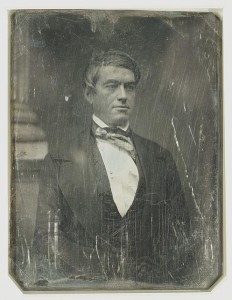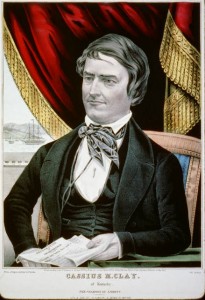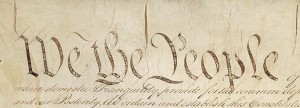Native Kentuckian Cassius Marcellus Clay “was a paradox, a southern aristocrat who became a prominent anti-slavery crusader”. While attending Yale he heard William Lloyd Garrison speak and decided to become an abolitionist. He served as a Kentucky state representative and published an anti-slavery newspaper. He was frequently attacked and received death threats for his views.
President Lincoln appointed Clay as ambassador to Russia, but he returned to the United States in 1862. The following article reports on a speech gave in New York City. Mr Clay criticized Democrats like New York gubernatorial candidate Horatio Seymour for opposing Lincoln’s emancipation proclamation on the grounds it was unconstitutional – why didn’t such Democrats complain about the southern states breaking the Constitution by seceding?
From the Richmond Daily Dispatch October 13, 1862:
Speech of Cassius M. Clay on the proclamation.
In New York, Tuesday night, at the Academy of Music, after a red-hot speech from Gen. Duryea, Major General Cassius M. Clay, of the U. S. Army, addressed the meeting. We make a few extracts from his speech, as reported:
He confessed that, as a military measure, he had never placed much importance on a decree of emancipation; but this he did know, that the rebels and their sympathizers did. Look at the curses, the impotent rage manifested at the South, and then say whether they consider it a brutum fulmen, a useless thing or no. These men who would have the Union as it was say that the thing is unconstitutional. Ah! have they at last shown some respect for that sacred instrument? (Applause.) These servile tools of a despotic power have at last grown conscientious about the Constitution! Those who formed the Government did not speak of the independent sovereignties of South Carolina or Virginia, did they? What were the great powers of sovereignty? The power of making war and peace, making treaties, issuing coin, keeping armies and navies. &c., did not belong to the people of South Carolina, or Virginia, but belonged to us, “the people of the United States.” When the South assumed those powers, and levied war upon the Government, where were then your Seymour and these men who denounce the proclamation? (Applause; cries of “Where were they?” “Hit them again.”) He claimed that all the acts of the President were in accordance with the spirit of the Constitution of the United States. It was complained that the habeas corpus act had been suspended; but did not the Constitution say that it should not be suspended, except in case of invasion or rebellion, and he asked would it be said that there was no rebellion? (A voice–“That’s the talk.”) The President had the power to do as he had done, and if a precedent was wanted they would make this the precedent forever. So far from finding fault with Abraham Lincoln, he rather found fault with him that he had not suspended the habeas corpus, not by a dash of the pen, but by the rope round the necks of these traitors.
A voice–“We’ll hang them yet.”
Mr. Clay–“Yes, sir, the hanging of such men as Seymour and Wood would have saved thousands of honest lives.”
Mr. Clay–That is true philanthropy. (Applause and laughter.) Go to the battle-field and you find thousands of brave and generous men sinking into the grave through the action of this rebellion, and yet there is no cry about the Constitution being violated by the South. Life, liberty and property had been sacrificed, and yet these men are silent about it; but when we defend ourselves against these plotters and scoundrels, and seek to defend the life of the nation, we are told it is unconstitutional. Why, would we confiscate all other sorts of property and refuse to touch slavery? So far as these slaves are property — putting the question on the low material basis — we have as much right to say to these slaves, “Run for it,” as we have to take the horses and mules who draw the cannon of the rebels. But when we put the question upon a higher basis much better right have we to say to these men. “Defend yourselves and fight for you liberties” (Applause)
Mr. Lincoln, in the charity of his heart, which is a large one, and the strength of his intellect, which is a great one–he is both great hearted and great needed– (applause)–had said to these slave-holders, “I would that you would be persuaded to do right. Liberate your slaves, return to our family circle; we will share our last dollar with you, and you will be none the worse for being magnanimous and just” The rebels had ninety days to decide upon his offer. Let them return to their allegiance and be saved. They had ninety days to do it in. If New York should in the fortune of this struggle be threatened with the terrors of war, the women and children might perhaps have one hour or six hours given them to seek a place of safety.–But these rebels get ninety days to prepare themselves and to avoid the evil. They may send their women and children into the possessions of their allies, the English. (His[s]es) Was not time enough given to them? How much more did they want?–How would the proclamation affect the nation in the matter of foreign intervention? He had precious little confidence in the aristocracy, the ruling classes of England, whether the Government was against slavery or for slavery. …
Give us the Constitution as it is, the Constitution as our fathers made it, and the Union as our fathers intended that it should be — a Union of free men. –Said James Madison: “I put not again the word Slave in the Constitution, because when this institution shall have ceased to exist, then let the memory of it also be forever banished from our records”–(Applause) There is but one peace — that is the peace of justice. There is but one secure basis of liberty and union — that is the unity of a common love of humanity, and the true and faithful, open, avowed, manly declaration of our fathers again reiterated, that “all men are created free and equal, entitled to life, liberty, and the pursuit of happiness.” (Applause) What a grand destiny-awaits us thirty-three States and about as many millions. Before many a man and woman who listens to me to night shall have gone to their last resting place, there will be a hundred millions of freemen bound together under a common flag and a common principle. Whose heart does not expand, whose intellect does not brighten, whose aspirations do not go up to the great and good God [ that that ] consummation may be perfected, that we may be one people, that there may prevail, not only over all this continent, but over the whole world, “liberty and union, now and forever, one and inseparable.” …
More notes: 1) We mentioned a surprisingly well-received anti-slavery extension speech Clay gave in Washington City back in January, 1861. 2) Clay would go back to Russia from 1863-1869. 3) In the New York speech we linked to here Clay gave kudos to Russia’s Alexander II who emancipated the serfs in 1861.



